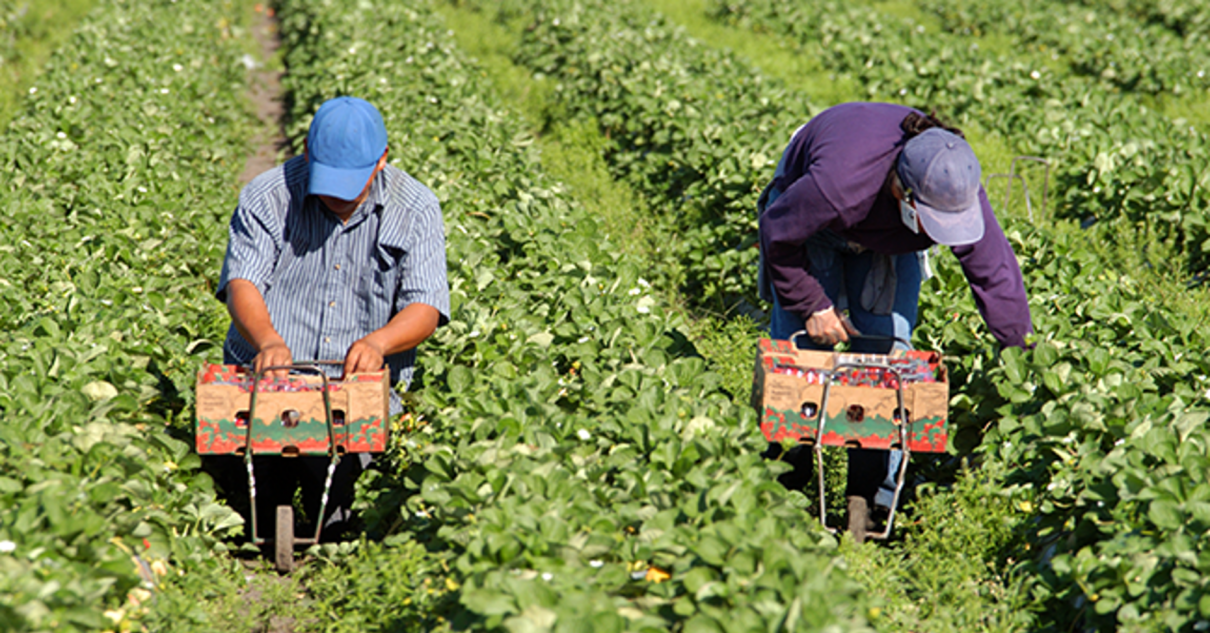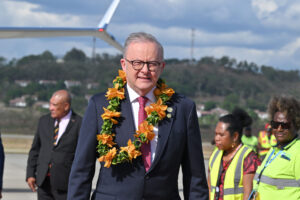A fair go for temporary workers from the Pacific

On a whistlestop tour of Fiji, Tonga, and Vanuatu in May, Foreign Minister Penny Wong wanted to focus on climate change, security, and aid funding.
But at press conferences in all three nations, reporters asked about Australia’s treatment of people from the Pacific who come to Australia on temporary work visas – it’s called the PALM scheme (which stands Pacific Australian labour mobility). In Vanuatu’s capital of Port Villa, which sends the highest number of people to work as part of the PALM scheme, Senator Wong assured one journalist that “PALM workers are entitled to the same conditions, legal conditions as Australian workers, and they should be treated as such.” Who wouldn’t agree?
Next time you’re looking over your pay slip, or looking for work, think about the basic rights you get that PALM workers don’t.
Like the right to change employer. Don’t like your boss? You can quit. Headhunted for something better? You can take it. Decided it’s time to throw in the towel and travel for a while? Bye-bye daily grind, hello funemployment. These are all rights that PALM workers do not have. A condition of the PALM visa is that Pacific workers must work exclusively for one employer for the entire length of their stay in Australia. Tough boss? Your problem. Job not what was described before you arrived? Your problem. While PALM workers are technically allowed to ask their boss if they can go and work for someone else, what are the odds the boss will say yes? Even if they do, there’s a complicated and lengthy bureaucratic process to go through, during which time the worker has to keep showing up, or risk being sent home.
Or how about the right to keep the money you earn for yourself? Sure, you have to pay for things like petrol or bus fare, and rent or mortgage repayments, but at least you get to choose where you live and how you get to work. PALM workers have money for transport and accommodation deducted from their pay before it hits their bank account. Their bosses can take money to cover the cost of the airline tickets to fly workers to Australia (something that is against the rules in Canada’s temporary worker programs), the application fee for the work visa, accommodation that could be a shared room, and transport from the accommodation to the abattoir or farm. Let’s just hope no employers would ever rip workers who can’t switch jobs off for their accommodation or transport.
How about your right to show up to a hospital and get fixed up if you hurt yourself? OK, Medicare isn’t a right just for workers, but it is another thing most people in Australia get, except for PALM visa holders (outside a limited trial). A lack of access to affordable healthcare is proving to be a particular problem for women who fall pregnant while they are working in Australia. Or your super. Most PALM workers make somewhere between $3800 to $15,000 in super while they’re here, but a lot of them have trouble actually getting it. The Australian Taxation Office (ATO) reportedly holds more than $1 billion in superannuation that temporary workers, including those on PALM visas, have not been able to claim. Who could have imagined that Pacific workers, some with poor English, some who live in places without a reliable Internet connection, would struggle with something as simple as getting money back from the ATO?
Or how about the right to earn a modest income before the government starts taxing you? PALM workers on nine-month visas are not Australian residents for tax purposes, which means they aren’t eligible for the $18,200 tax-free threshold that other workers get – instead they are charged a flat 15% on all earnings, from the very first dollar. In its first term, the Labor Government introduced the “Same Job, Same Pay” reforms. It’s a fine slogan, but it must ring hollow for our “Pacific family”. These workers do jobs that, as advocates of the program are quick to remind us, most Australians won’t do. Their take-home pay should not be a single cent lower than other workers – wherever they come from – are entitled to, but thanks to the lack of a tax free threshold PALM workers often take home less pay than other workers, and that’s even before they have to pay what their employer takes for accommodation and training.
More than 30,000 people work in Australia as part of the PALM scheme. They are here strictly on a temporary basis – either nine months or four years, depending on the visa. And these PALM visa workers are only allowed to work in so-called “unskilled” jobs. So many work in agriculture and meat processing that it’s hard to imagine how Australia’s food processing industry would function without them. And an increasing number of Pacific guest workers are employed as carers, particularly aged care. This is why the scheme is so often touted as a “win-win”: Australia gets access to a labour force willing to do the jobs most Australians wouldn’t, and people from nine Pacific Island nations and Timor-Leste get the opportunity to earn Australian dollars. That might be OK in principle, but in practice Australia is winning big and a lot of Pacific workers feel they have been let down.
The power imbalance these employment conditions create means that reports of the abuse of PALM workers are well documented. Last year, the United Nations Special Rapporteur on Contemporary Forms of Slavery said he was “seriously concerned” about the treatment of PALM workers in Australia. Likewise a report from the NSW anti-slavery commissioner has led to a NSW Government inquiry.
PALM workers do the dirtiest, hardest, lowest paid jobs in Australia. We’re kidding ourselves if we think this is always a win win. We prefer to rely on PALM workers to pick our fruit and cut up the cattle that become our sausages. We prefer to depend on them to take care of our grandparents. If Australia is the land of the fair go, why aren’t PALM workers allowed to leave their employer, keep the money they earn for themselves, get Medicare or the tax-free threshold?
Back at the press conference in Vanuatu, Minister Wong “reaffirmed the deep and enduring partnership between Vanuatu and Australia,” which she called “a relationship built on mutual respect.” But if we are serious about forging good relations with our nearest neighbours, we should treat PALM workers with respect, dignity and maybe even a bit of gratitude.
Between the Lines Newsletter
The biggest stories and the best analysis from the team at the Australia Institute, delivered to your inbox every fortnight.
You might also like
Modern slavery in Australia? | PALMed Off, Episode 1
In this summer mini-series, we examine the Australian guestworker program that could be putting people from Pacific Island nations and Timor-Leste at risk of modern slavery.
What can be done to fix the PALM scheme? | PALMed Off, Episode 4
What would it take to make the PALM scheme a genuine win-win for Australia and its neighbours?
Pacific nations have just delivered Australia two smackdowns. That’s a big deal.
We need to talk about the Pacific.


